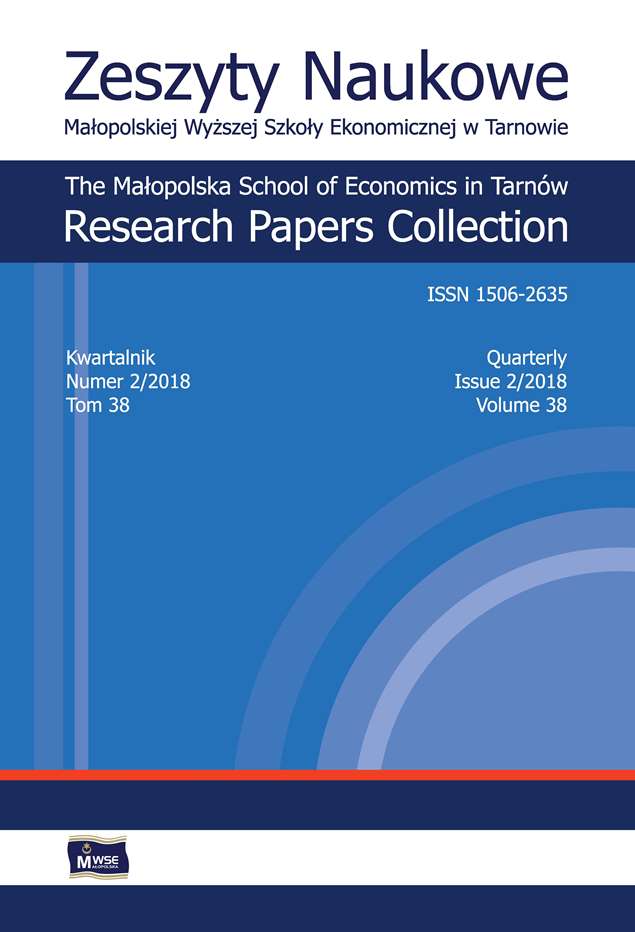Abstract
The aim of the publication is to make a statistical and comparative analysis of the universality of planning and use of modern technologies in production enterprises, operating in the European Union Member States. The basis for such analysis is the empirical material derived from TNS Political & Social questionnaire surveys carried out in February 2015 and 2016. Two research methods were used to prepare the publication: critical-cognitive analysis of literature and statistical-comparative analysis of the empirical material. The article consists of an introduction, an empirical part and a conclusion. The analysis of the empirical material indicates a relatively low and diversified universality of planning and use of advanced technologies. On average, 66% of enterprises in the EU did not use any modern technologies which was 14 percentage points more than a year before. 64% of enterprises did not plan to use any advanced technology in the following 12 months which was 12 pp. more than a year before. The reasons for such a situation seem to be: management errors; focus on current affairs; avoidance of strategic and innovative management; limited interest in market information acquisition; too little inclusion of clients into co-creation of values; limited cooperation with external organizations within the network.
References
Advanced technology. (2017). W: Gartner IT Glossary [online, dostęp: 2017-09-24]. Dostępny w Internecie: http://www.gartner.com/it-glossary/advanced-technology.
View in Google Scholar
Baruk, J. (2006). Zarządzanie wiedzą i innowacjami. Toruń: Wydawnictwo Adam Marszałek. ISBN 9788374414067.
View in Google Scholar
Baruk, J. (2017). Wybrane aspekty wdrażania i komercjalizacji innowacji marketingowych. Marketing i Rynek, 2, 2–14.
View in Google Scholar
Cavalcante, S.A. (2013). Understanding the impact of technology on firms’ business models. European Journal of Innovation Management, 16(3), 285–300.
View in Google Scholar
Chernetska, D. (2017). Expanding frontiers of customer knowledge management to sustain competitive advantage: The mediating role of predictive analytics. Eurasian Journal of Business and Management, 5(1), 1–15.
View in Google Scholar
Della Corte, V., Zamparelli, G., Micera, R. (2013). Innovation in tradition-based firms: Dynamic knowledge for international competitiveness. European Journal of Innovation Management, 16(4), 405–439.
View in Google Scholar
Griffin, R. (2007). Podstawy zarządzania organizacjami. Warszawa: Wydawnictwo Naukowe PWN. ISBN 9788301149444.
View in Google Scholar
Innobarometer 2015 – the innovation trends at EU enterprises. Report. Flash Eurobarometer 415 – TNS Political & Social, September 2015.
View in Google Scholar
Innobarometer 2016 – EU business innovation trends. Report. Flash Eurobarometer 433 – TNS Political & Social, February 2016.
View in Google Scholar
Krusinskas, R., Norvaisiene, R., Lakstutiene, A., Vaitkevicius, S. (2015). Investment, innovation and firm performance: Empirical evidence from small manufacturing industries. Journal of Finance and Economics, 3(6), 122–131.
View in Google Scholar
Lee, S.M., Olson, D.L., Trimi, S. (2012). Co-innovation: convergenomics, collaboration, and co-creation for organizational values. Management Decision, 50(5), 817–831.
View in Google Scholar
Prahalad, C.K., Ramaswamy, V. (2005). Przyszłość konkurencji. Warszawa: PWE. ISBN 8320815800.
View in Google Scholar
Roach, D.C., Ryman, J.A., Makani, J. (2016). Effectuation, innovation and performance in SMEs: an empirical study. European Journal of Innovation Management, 19(2), 214–238.
View in Google Scholar
Świtalski, W. (2005). Innowacje i konkurencyjność. Warszawa: Wydawnictwo Uniwersytetu Warszawskiego. ISBN 9788323502487.
View in Google Scholar
Task Force Meeting on Oslo Manual Revision. (2004). Chapter 3: innovation definitions, Eurostat, Luxembourg, 24 November 2004.
View in Google Scholar
© Copyright by Małopolska School of Economics in Tarnów. The articles are available under the Creative Commons Attribution NonCommercial-NoDerivatives 4.0 International License


